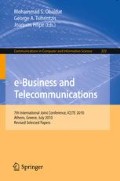Abstract
Designing non-committing encryptions tolerating adaptive adversaries is a challenging task. In this paper, a simple implementation of non-committing encryptions is presented and analyzed in the strongest security model. We show that the proposed non-committing encryption scheme is provably secure against adaptive adversaries in the universally composable framework assuming that the decisional Diffie-Hellman problem is hard.
Access this chapter
Tax calculation will be finalised at checkout
Purchases are for personal use only
Preview
Unable to display preview. Download preview PDF.
References
Beaver, D.: Plug and Play Encryption. In: Kaliski Jr., B.S. (ed.) CRYPTO 1997. LNCS, vol. 1294, pp. 75–89. Springer, Heidelberg (1997)
Beaver, D., Haber, S.: Cryptographic Protocols Provably Secure Against Dynamic Adversaries. In: Rueppel, R.A. (ed.) EUROCRYPT 1992. LNCS, vol. 658, pp. 307–323. Springer, Heidelberg (1993)
Canetti, R.: A new paradigm for cryptographic protocols. In: FOCS 2001, pp. 136–145 (2001)
Canetti, R., Fischlin, M.: Universally Composable Commitments. In: Kilian, J. (ed.) CRYPTO 2001. LNCS, vol. 2139, pp. 19–40. Springer, Heidelberg (2001)
Canetti, R.: Universally Composable Security: A New Paradigm for Cryptographic Protocols, eprint.iacr.org (December 14, 2005)
Canetti, R., Feige, U., Goldreich, O., Naor, M.: Adaptively Secure Multi-Party Computation. In: STOC 1996, pp. 639–648 (1996)
Choi, S.G., Dachman-Soled, D., Malkin, T., Wee, H.: Improved Non-committing Encryption with Applications to Adaptively Secure Protocols. In: Matsui, M. (ed.) ASIACRYPT 2009. LNCS, vol. 5912, pp. 287–302. Springer, Heidelberg (2009)
Damgård, I., Nielsen, J.B.: Improved Non-committing Encryption Schemes Based on a General Complexity Assumption. In: Bellare, M. (ed.) CRYPTO 2000. LNCS, vol. 1880, pp. 432–450. Springer, Heidelberg (2000)
Freedman, M.J., Ishai, Y., Pinkas, B., Reingold, O.: Keyword Search and Oblivious Pseudorandom Functions. In: Kilian, J. (ed.) TCC 2005. LNCS, vol. 3378, pp. 303–324. Springer, Heidelberg (2005)
Garay, J.A., Wichs, D., Zhou, H.-S.: Somewhat Non-Committing Encryption and Efficient Adaptively Secure Oblivious Transfer. In: Halevi, S. (ed.) CRYPTO 2009. LNCS, vol. 5677, pp. 505–523. Springer, Heidelberg (2009)
Lindell, Y., Pinkas, B.: Privacy Preserving Data Mining. J. Cryptology 15(3), 177–206 (2002)
Naor, M., Pinkas, B.: Efficient oblivious transfer protocols. In: SODA 2001, pp. 448–457 (2001)
Peikert, C., Vaikuntanathan, V., Waters, B.: A Framework for Efficient and Composable Oblivious Transfer. In: Wagner, D. (ed.) CRYPTO 2008. LNCS, vol. 5157, pp. 554–571. Springer, Heidelberg (2008)
Pinkas, B.: Cryptographic Techniques for Privacy-Preserving Data Mining. SIGKDD Explorations 4(2), 12–19 (2002)
Nielsen, J.B.: Separating Random Oracle Proofs from Complexity Theoretic Proofs: The Non-committing Encryption Case. In: Yung, M. (ed.) CRYPTO 2002. LNCS, vol. 2442, pp. 111–126. Springer, Heidelberg (2002)
Zhu, H., Araragi, T., Nishide, T., Sakurai, K.: Adaptive and Composable Non-committing Encryptions. In: Steinfeld, R., Hawkes, P. (eds.) ACISP 2010. LNCS, vol. 6168, pp. 135–144. Springer, Heidelberg (2010)
Zhu, H., Bao, F.: Non-committing Encryptions Based on Oblivious Naor-Pinkas Cryptosystems. In: Roy, B., Sendrier, N. (eds.) INDOCRYPT 2009. LNCS, vol. 5922, pp. 418–429. Springer, Heidelberg (2009)
Zhu, H., Bao, F.: Error-free, Multi-bit Non-committing Encryption with Constant Round Complexity. In: Lai, X., Yung, M., Lin, D. (eds.) INSCRYPT 2010. LNCS, vol. 6584, pp. 52–61. Springer, Heidelberg (2011)
Author information
Authors and Affiliations
Editor information
Editors and Affiliations
Rights and permissions
Copyright information
© 2012 Springer-Verlag Berlin Heidelberg
About this paper
Cite this paper
Zhu, H., Araragi, T., Nishide, T., Sakurai, K. (2012). Universally Composable Non-committing Encryptions in the Presence of Adaptive Adversaries. In: Obaidat, M.S., Tsihrintzis, G.A., Filipe, J. (eds) e-Business and Telecommunications. ICETE 2010. Communications in Computer and Information Science, vol 222. Springer, Berlin, Heidelberg. https://doi.org/10.1007/978-3-642-25206-8_18
Download citation
DOI: https://doi.org/10.1007/978-3-642-25206-8_18
Publisher Name: Springer, Berlin, Heidelberg
Print ISBN: 978-3-642-25205-1
Online ISBN: 978-3-642-25206-8
eBook Packages: Computer ScienceComputer Science (R0)

